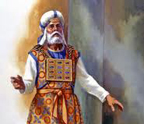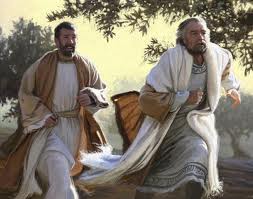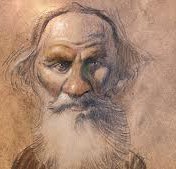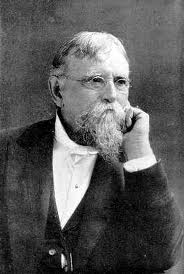(You may be going through a season you don't understand. I know a lot of folks are. This may help you!) Leviticus chapter 8:5-13 describes a very clear process that the Lord uses to prepare His servants. Four successive and progressive steps are involved: stripping, washing, clothing, and then anointing. Each step in this process is important and can not be avoided if we are to be truly effective in representing and serving the Lord. One problematic aspect of this process is that it often happens, not in a cave somewhere but in the plain view of many others. In this short note I will address the first aspect of the process.
Leviticus chapter 8:5-13 describes a very clear process that the Lord uses to prepare His servants. Four successive and progressive steps are involved: stripping, washing, clothing, and then anointing. Each step in this process is important and can not be avoided if we are to be truly effective in representing and serving the Lord. One problematic aspect of this process is that it often happens, not in a cave somewhere but in the plain view of many others. In this short note I will address the first aspect of the process.
“And Moses said unto the congregation, This is the thing which the LORD commanded to be done.And Moses brought Aaron and his sons, and washed them with water. And he put upon him the coat, and girded him with the girdle, and clothed him with the robe, and put the ephod upon him, and he girded him with the curious girdle of the ephod, and bound it unto him therewith. And he put the breastplate upon him: also he put in the breastplate the Urim and the Thummim. And he put the mitre upon his head; also upon the mitre, even upon his forefront, did he put the golden plate, the holy crown; as the LORD commanded Moses. And Moses took the anointing oil, and anointed the tabernacle and all that was therein, and sanctified them. And he sprinkled thereof upon the altar seven times, and anointed the altar and all his vessels, both the laver and his foot, to sanctify them. And he poured of the anointing oil upon Aaron’s head, and anointed him, to sanctify him. And Moses brought Aaron’s sons, and put coats upon them, and girded them with girdles, and put bonnets upon them; as the LORD commanded Moses."
Stripping
Prior to Aaron’s washing, Moses was instructed to invite the entire nation to appear at the door of the tabernacle of meeting as witnesses of the stripping, washing, clothing, and anointing of Aaron and his sons. This event was entirely public. Some believe that Aaron was literally stripped while others believe that the act was symbolic. The text does not explicitly determine that he was stripped but does say that Moses washed him before he clothed him with the priestly garments.
It is difficult for me to conclude that Aaron was washed fully clothed and then clothed again with the priestly garments. Moses also preceded his actions with this comment: “This is what the LORD commanded to be done.” I also would preface such an action with this command of the Lord. Wouldn’t you?
Being stripped publicly is humiliating. No one wants to have his weaknesses openly displayed. Yet many in ministry go through periods of time when they feelnaked and barren. In a real way they are. The stripping process is the purpose of the Lord and is intended to do at least five different things in each of us;
1) bring us to a new place of dependence upon God, 2) deal with our pride, 3) show us how every man feels, 4) reveal unhealed wounds, 5) identify us as true children of God.
Becoming Dependent
One of the purposes for stripping is to make us more dependent upon theLord. In the Garden of Eden Adam and Eve failed the dependence test. Eating from the tree of the knowledge of good and of evil empowered them to express independence from God. Both the act of disobedience and the fruit of the tree separated them from Him. No longer did they need to confer with the Lord about situations that arose. Now they possessed an inner source to aid them in determining what was good, but how good could it be if God forbade them to have it? Satan promised them that the tree would enable them to become gods, inferring that the Lord had withheld something from them that He should have given them. The original children of God took that bait and we have been doing the same ever since. We must return to a place of absolute dependence upon the Lord. We discover our need for consistent grace from Him when we are stripped and also find ways to lean upon Him during those painful yet precious times. During times of vulnerability, we determine whether we are going to look to Him for His covering or, like Adam and Eve, provide a substitute of our own.
Humbling Ourselves
Times of being barren provide opportunities for us to choose God, to admit our need for Him, and receive His grace. The hardness of our hearts and the natural inclination towards covering ourselves keep us from being fully restored to the Lord and thus become more effective in ministering to His people. God does not forgive our excuses but our sins. It is important for us to be honest with ourselves and the Lord. This process effects humility and positions to receive His grace for our need, and find the place where we live to God -not to men.
I once read that humility is not thinking less of ourselves as much as it is thinking of ourselves less. The stripping process positions us to be cleansed, healed, and clothed to enable us to do just that.
Becoming Compassionate
According to Isaiah 53:3 Jesus was “...a Man of sorrows and acquainted with grief.” He was able to understand the plight of man, having become one with our basic limitations and temptations. Other scripture also reveals this aspect of Christ’s humanity:
“Therefore, in all things He had to be made like His brethren, that He might be a merciful and faithful High Priest in things pertaining to God, to make propitiation for the sins of the people. For in that He Himself has suffered, being tempted, He is able to aid those who are tempted (Hebrews 2:17-18).
“For we do not have a High Priest who cannot sympathize with our weaknesses, but was in all points tempted as we are, yet without sin. Let us therefore come boldly to the throne of grace, that we may obtain mercy and find grace to help in time of need” (Hebrews 4:15-16).
Jesus was a merciful High Priest because He had been made like His brethren. He can sympathize with our weaknesses because of the process of temptation He endured. Temptation is not real unless one feels the strength of it is or the reality of its weakness. He sat where we sat. He walked in our shoes. The stripping process we experience helps us to identify with lives of the common man. Compassion can come from knowing the depths of our own personal needs and allowing the experience to help us identify with others who also suffer.
Unhealed Wounds
Another purpose for the stripping process is to enable us to clearly identify unhealed wounds that are festering under the surface. These wounds can disqualify us from ministry. When we minister from a place of wounding we can easily misrepresent the Lord to others. It is clear from the Levitical requirements that scabs disqualified priests from ministry. Scabs speak of the wounds that are not healed. For many, during barren times we are faced with incomplete personal issues that can rise to bite us, and ultimately destroy us and others. Therefore the Lord often uses this season of stripping to help identify areas that need to be addressed. Many times we are blind to our needs, but as we see these unhealed areas in our lives, we can give them to the Lord and be restored.
Confirming Our Place in His Family
The book of Hebrews has some very troubling scriptures in it, troubling that is until we are in a place to see them and appreciate them accurately.
“And you have forgotten the exhortation which speaks to you as to sons: My son, do not despise the chastening of the Lord, nor be discouraged when you are rebuked by Him; For whom the Lord loves He chastens, and scourges every son whom He receives. If you endure chastening, God deals with you as with sons; for what son is there whom a father does not chasten? But if you are without chastening, of which all have become partakers, then you are illegitimate and not sons” (Hebrews 12:5-8).
The writer of Hebrews confirms a very important truth; chastening and scourging from the Lord are essential and are one way He acknowledges us as His children. “Whom the Lord loves, He chastens, and scourges every son whom He receives.” The word receives may also be translated ‘delight’, ‘accept near’, or ‘to acknowledge as one’. His chastening and scourging come from His love and prove that we are His. Rather than being discouraged we should take heart that He is disciplining us as His own.
The writer continues:
“For they indeed for a few days chastened us as seemed best to them, but He for our profit, that we may be partakers of His holiness. Now no chastening seems to be joyful for the present, but painful; nevertheless, afterward it yields the peaceable fruit of righteousness to those who have been trained by it” (Hebrews 12:10-11).
Being stripped can be quite fruitful. If we respond well it can be a method God uses to impart to us His holiness. If we allow Him to train us in this particular way, it will produce in us His true peace as fruits of righteousness. Such is the benefit of the stripping of the Lord.
Conclusion
The process of being stripped is but the first and most difficult part of the process in the life of those who are called to stand for Him. As much as we might hope, this does not only happen once, but is an ongoing aspect of our experience in God. Years ago I heard this statement from a dear friend of mine.
“Each time Joseph advanced in his spiritual experience it was at the expense of his clothing”!
Joseph’s spiritual journey began when his jealous and hate filled brothers stripped him of his coat of many colors. After being sold into slavery his owner’s wife forced him to flee from her sexual advances, leaving his garment in the her hands. Her false accusations put him in prison.
In prison Joseph accurately interpreted several dreams ultimately bringing him to the attention of the ruler of Egypt. Before Joseph could approach Pharoah he, compelled by propriety and custom, changed his clothes once more. When Pharoah made Joseph second in command in all of Egypt he put a ring on his hand, a gold chain around his neck and, yes, once again made him change his clothes, giving him garments of fine linen. Joseph became so accustomed to this process that before he died he determined to exchange a tomb embedded in the clothing of Egyptian soil for one he yearned for in his own homeland.
“Then Joseph took an oath from the children of Israel, saying, God will surely visit you, and you shall carry my bones from hence” (Genesis 50:25).
Right up to the end of his life, and even beyond, Joseph submitted to this process. He did not want to remain clothed with Egyptian soil. Some have surmised of him that he foresaw the resurrection of Jesus and wanted to be buried near Jerusalem for that remarkable event. If that is true he could have once again changed clothes, this time trading the garment of flesh for a resurrection body as recorded in Matthew 27:52-53:
“and the graves were opened; and many bodies of the saints who had fallen asleep were raised; and coming out of the graves after His resurrection, they went into the holy city and appeared to many.”
I can hear Joseph now, testifying as he walked through the streets of Jerusalem with some of the historic patriarchs of Israel: “Look at what the Lord has done. Is it not marvelous in your eyes!”
The ongoing stripping of Joseph’s typified his spiritual progress. Our progress will come the same way. Paul exhorted the Ephesian saints in this manner;
“that you put off, concerning your former conduct, the old man which grows corrupt according to the deceitful lusts, and be renewed in the spirit of your mind, and that you put on the new man which was created according to God, in true righteousness and holiness” (Ephesians 4:22).
And to the church in Rome Paul encourages them to clothe themselves with the Lord:
“But put on the Lord Jesus Christ, and make no provision for the flesh, to fulfill its lusts” (Romans 13:14).
I once read that humility is not 'thinking less of yourself' but 'thinking of yourself less'. We are called to put on, not ourselves, but the Lord Jesus Christ. We have deliverance in looking to Him, not in looking at ourselves to somehow fix ourselves.
The Lord Himself endured public humiliation as part of His cross. Know that this process is an experiential aspect of the cross that we are encouraged to bear on a daily basis.
“Then the soldiers of the governor took Jesus into the Praetorium and gathered the whole garrison around Him. And they stripped Him and put a scarlet robe on Him” (Matthew 27:27-28).
“Then they crucified Him, and divided His garments, casting lots, that it might be fulfilled which was spoken by the prophet:
“They divided My garments among them and for My clothing they cast lots” (Matthew 27:35)
Jesus Christ was altogether perfect and yet he endured just such treatment. Shall we escape the same. If we are to walk in the power of His resurrection shall we not also participate with Him in the fellowship of His sufferings? Paul prayed for just such reality in his own life:
“that I may know Him and the power of His resurrection, and the fellowship of His sufferings, being conformed to His death, if by any means, I may attain to the resurrection from the dead” (Philippians 3:10-11).
It is important to understand that this process is part of our walk with the Lord so that we will not respond poorly in the midst of His on-going preparation and dealing. The statement Moses made, “This is what the LORD commanded to be done” (Leviticus 8:5), was not just a disclaimer to comfort and justify him as he obeyed the Lord in a very difficult situation. It was a prophetic statement that continues to ring down through the ages, penetrating and challenging the hearts of servants of the Lord in each proceeding generation. This process of stripping, washing, clothing, and anointing will be our experience on a continual seasonal basis.
Two mountain climbers, one ascending, another descending. The one who had yet to reach the summit inquired of the climber who was returning from the summit:
“Is the climb steep” he questioned?
“Yes”, came the response, “all the way to the top.”
Some aspects of this life with the Lord will always be a challenge. Knowing and walking with Him will be a continual life of climbing. But our climb will be and must be with Him, all the way to the top.
 N.T. Wright wrote of the gospels:
"These are not merely antiquarian documents telling a strange story about a powerful but now long-gone moment of history. They are the moment of sunrise on a new morning, casting a strange glory over the landscape and inviting all readers to wake up, rub the sleep from their eyes, and come out to enjoy the fully dawned day and give themselves to its tasks."
N.T. Wright wrote of the gospels:
"These are not merely antiquarian documents telling a strange story about a powerful but now long-gone moment of history. They are the moment of sunrise on a new morning, casting a strange glory over the landscape and inviting all readers to wake up, rub the sleep from their eyes, and come out to enjoy the fully dawned day and give themselves to its tasks."










